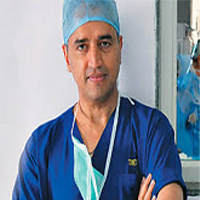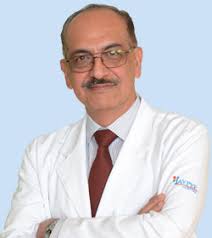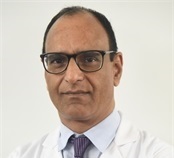Coronary Artery Bypass Graft (CABG) Surgery in India IN INDIA
Coronary artery disease widely known as CAD is an artery that supplies blood to your heart. CADs are grouped under cardiovascular disease which according to WHO accounts for more than 32% of deaths worldwide. In developed countries coronary artery diseases are a public health problem. Coronary artery disease (CAD) occurs when the inner lining of the arteries becomes damaged due to the buildup of plaque on the vessel walls. This plaque accumulation causes the arteries to harden and narrow, a condition known as atherosclerosis. As a result, blood flow is restricted, putting extra strain on the heart and potentially leading to a heart attack. High cholesterol levels, stress and a sedentary lifestyle are the main villains of the story!
Coronary Artery Bypass Grafting (CABG) is a surgery where a blocked coronary artery is bypassed using a healthy artery or vein. If there are additional blockages that cannot be bypassed with an artery, a vein (often the saphenous vein from the leg) is used to create a new route from the aorta to the coronary artery, bypassing the blockage. Comprehensive management plays a crucial role, Fortis Cardiac Care in Gurugram believes in wellness and works with patients closely in an integrated manner.
There is some debate about when CABG should be done, but doctors agree on a few points:
- The surgery is generally safe, with a very low risk of death (less than 1%) in patients who are otherwise healthy, have a well-functioning heart, and are operated on by an experienced surgical team. Marengo Hospital in Gurugram has highly experienced doctors, successfully performing 400+ surgeries.
- The risk of death during or after surgery increases if the patient has severe heart problems, other health issues, is older than 80, or if the surgical team is less experienced. The success and risk of the surgery greatly depend on choosing the right cases and the skill of the surgeons.
Advantages of CABG
- Angina is abolished or greatly reduced in -90% of patients after complete revascularization.
- Survival may be improved by operation in patients with stenosis of the left main coronary artery as well as in patients with significant obstruction of the proximal left anterior descending coronary artery
- Survival may also be improved in the following patients: (a)patients with obstructive CAD who have survived sudden cardiac death; (b) patients who have undergone previous CABG, especially of a graft supplying the left anterior descending coronary artery, and (c) patients with recurrent stenosis.
Opting for a surgical treatment can be challenging. Talk to your healthcare provider about the severity of coronary heart disease. Multiple blockage needs surgical intervention if medicines have failed to show improvement.
CAB can also lower the risk of future heart attacks, improve heart function, and enhance your overall quality of life. For some patients, especially those with complex blockages or diabetes, CABG has been shown to provide better long-term outcomes compared to other treatments. Ultimately, CABG may offer a better chance of a longer, healthier life by restoring adequate blood flow to your heart. All you need is well experienced doctors, sometimes multiple opinions. Visit Max Hospital in Gurugram and get treated by the best!
Factors That Influence the Cost of CABG Treatment in India
Here are some factors that influence the cost of treatment in India. Cost is explained through a few examples as well.
Diagnostic Cost:
The overall cost of CABG surgery includes the expenses for diagnostic tests, such as blood tests, ECG, and imaging studies (like a CT scan or angiography) performed before the procedure. For example, a coronary angiogram in India may cost between ₹15,000 and ₹35,000, depending on the hospital.
Doctor’s Expertise:
The cost of CABG surgery often varies based on the surgeon’s experience and reputation. Highly skilled and well-known doctors charge more for their services. For example, a renowned cardiac surgeon who has performed over 1,000 successful CABG surgeries will likely charge a higher consultation fee (₹5,000 to ₹10,000) compared to a less experienced doctor (₹1,500 to ₹3,000).
Location:
The hospital’s location plays a significant role in determining the cost of the surgery. Hospitals in prime areas tend to be more expensive than those in less populated areas. For instance, the cost of CABG surgery in upscale Mumbai neighbourhoods like Bandra, Colaba, or Worli could range between ₹2,50,000 and ₹4,50,000, while hospitals in suburban areas or smaller cities may charge significantly less, around ₹1,50,000 to ₹2,00,000.
Hospital’s Ownership:
The type of hospital, whether public or private, greatly affects the cost of treatment. Government hospitals typically offer lower costs. For example, a CABG surgery in a government hospital may cost as low as ₹80,000, while in a private hospital, the same procedure can go up to ₹4,00,000 or more.
Insurance/Out of Pocket Expense:
If you have health insurance that covers CABG surgery, your out-of-pocket expenses will be minimal. For example, if your insurance covers 80% of the treatment, you may only need to pay ₹40,000 for a procedure costing ₹2,00,000. However, if you’re uninsured, you will need to bear the entire cost, which can be a significant financial burden.
The Price of CABG Surgery in Top Indian Hospitals
Average cost of CABG is 3 lakhs, it can vary according to facilities and other factors like stay, visa etc. here is a list of some top hospitals and the cost of treatment.
Max Hospital, Gurugram : The hospital provides top-notch facility, patient care under experienced team and follows strict protocols in terms of hygiene. They have advanced technology to treat patients and provide the highest quality of services. Cost of CABG can go up to 5 lakhs depending on the stay in the hospital.
Apollo Hospitals : Known for its advanced techniques and skilled clinicians, and offers a variety of CABG surgeries, including minimally invasive and robotic procedures. Cost of minimally invasive surgery varies from 2.2 lakhs to 9.9 lakhs, depending on the severity of the condition.
Fortis Escorts Heart Institute : This hospital is renowned for its specialisation in treating patients with heart condition for over 25 years. The cost of CABG varies from 2.5 lakhs to 5.5 lakhs depending on the complexity of the case.
Medanta Medicity Gurugram : The hospital was named as the best private hospital for consecutive 2 years. Services provided by the hospital are patient centric and well customised by expert clinicians around the globe. On an average the cost of the treatment is 1.2 lakhs to 4.4 lakhs depending on the stay of the hospital.
Artemis Hospital Gurugram : The hospital is accredited by JCI and is well known for its state-of-the-art-services in heart surgery. Artemis ensures billing and insurance policies as well. If you have an insurance policy, talk to the hospital for better cost cutting.
Comparing the Cost of CABG Surgery in India vs. Other Countries
Opting for treatment in India offers several advantages over seeking medical care abroad, particularly for complex procedures like Coronary Artery Bypass Grafting (CABG). India is renowned for its highly skilled doctors and world-class healthcare facilities that meet international standards. The country has a vast network of hospitals equipped with state-of-the-art technology, ensuring patients receive top-notch care. Additionally, Indian healthcare providers follow strict hygiene protocols and offer personalized care, often surpassing the service levels seen in other countries.
One of the most compelling reasons to choose India is the cost-effectiveness of medical procedures. In India, CABG costs between ₹3,73,500 and ₹10,79,000, whereas the same procedure in countries like the USA, UK, or Germany can cost several times more. This makes India a highly affordable option without compromising on quality. Furthermore, shorter waiting times for surgeries and treatments, along with the availability of post-operative care, make India an ideal destination for medical tourism.
India also offers the advantage of cultural familiarity and proximity, particularly for patients from neighbouring countries. Overall, by choosing India for medical treatment, patients can access high-quality healthcare at a fraction of the cost, along with the benefit of personalised, compassionate care.
The cost of Coronary Artery Bypass Grafting (CABG) converted into Indian currency (INR) is as follows:
- India: ₹3,73,500 to ₹10,79,000
- USA: ₹74,70,000 to ₹1,66,00,000
- UK: ₹33,20,000 to ₹83,00,000
- Germany: ₹33,20,000 to ₹83,00,000
- Japan: ₹24,90,000 to ₹66,40,000
- China: ₹24,90,000 to ₹66,40,000
Top Coronary Artery Bypass Graft (CABG) Surgery in India Doctors in India
The right doctor to consult for a Coronary Artery Bypass Graft (CABG) Surgery in India case.
Dr. Ashok Seth
Year of experience: 40
Senior Consultant at Fortis Escorts Heart Institute, Delhi
Dr. Atul Mathur
Year of experience: 41
Executive Director and Senior Consultant at Fortis Escorts Heart Institute, Delhi
Dr. D.K. Jhamb
Year of experience: 29
Director and Senior Consultant at Shalby Sanar International Hospital, Gurgaon, India
Dr. Ganesh K. Mani
Year of experience: 37 Years of Experience
Dr. K. K. Saxena
Year of experience: 44
Consultant at Indraprastha Apollo Hospital, Delhi
Dr. Mahesh Chandra Garg
Year of experience: 49 Years of Experience
Dr. Murtaza Ahmed Chishti
Year of experience: 34 years of experience
Dr. Nikhil Kumar
Year of experience: 42
Senior Consultant at Fortis Memorial Research Institute, Gurgaon
Dr. Praveen Chandra
Year of experience: 37+ Years of Experience
Dr. Rajneesh Malhotra
Year of experience: 31+ Years of Experience
Dr. Sandeep Attawar
Year of experience: 22 years of experience
Dr. Sanjeev Chaudhary
Year of experience: 30
Chairman and Senior Consultant at Marengo Asia Hospitals Formerly W Pratiksha Hospital, Gurgaon
Dr. T. S. Kler
Year of experience: 48
Senior Consultant at BLK Super Speciality Hospital
Dr. Udgeath Dhir
Year of experience: 18+ Years of Experience
Dr. Y K Mishra
Year of experience: 32 years of experience
Looking For The Best Doctor & Hospital?
Fill up the form and get assured assitance within 24 hrs!
Redefining the Success of CABG
The success rate of Coronary Artery Bypass Grafting (CABG) in India is highly impressive, with outcomes comparable to those in developed countries. The procedure’s success rate in India ranges between 95% and 98%, depending on factors like patient health, the complexity of the surgery, and the expertise of the surgical team. Indian hospitals are equipped with advanced technology and employ highly skilled surgeons, contributing to these high success rates. Additionally, the recovery process is well-managed, with comprehensive post-operative care to ensure long-term patient health.
Post-operative care in India is an essential part of the treatment plan. Most hospitals provide extensive rehabilitation programs that include monitoring heart health, lifestyle changes, and medication management to prevent future complications. Regular follow-ups with cardiologists and dieticians are also emphasised to ensure a smooth recovery and improve the quality of life after surgery.
The combination of high success rates and thorough post-care protocols makes India a preferred destination for CABG. Patients not only benefit from advanced surgical techniques but also from continuous medical support that enhances recovery and long-term health outcomes.
FAQs
Frequenty Ask Questions
- Why do young people experience heart attacks?
Young people can experience heart attacks due to a combination of lifestyle factors, including poor diet, physical inactivity, smoking, and stress, which contribute to obesity, hypertension, and other cardiovascular risks. Additionally, rising rates of obesity and metabolic syndrome in younger populations, along with genetic predispositions or family history of heart disease, further increase their vulnerability. These factors can lead to early onset of conditions traditionally associated with older age, such as atherosclerosis and high cholesterol, ultimately raising the risk of heart attacks in young individuals.
- What are the risk factors of coronary artery diseases?
Coronary artery disease (CAD) is influenced by several risk factors, including unhealthy lifestyle choices such as poor diet, physical inactivity, smoking, and excessive alcohol consumption, all of which contribute to obesity, high blood pressure, and unhealthy cholesterol levels. Medical conditions like hypertension, high cholesterol, diabetes, and obesity further increase the risk of CAD by promoting plaque buildup in the arteries. Family history and genetics also play a significant role, particularly if close relatives developed CAD at an early age.
- Can you live a long life with coronary artery diseases?
Yes, it is possible to live a long life with coronary artery disease (CAD) if it is properly managed. While CAD is a serious condition, advancements in medical treatment, lifestyle modifications, and early detection can significantly improve outcomes. Patients with CAD can manage their condition through medications, regular physical activity, a heart-healthy diet, and by avoiding smoking and excessive alcohol consumption.
- How much blockage is normal?
In healthy individuals, the coronary arteries should have minimal to no blockage, as even small amounts of narrowing can impact blood flow to the heart. Generally, a blockage of less than 20% is considered normal and not significant enough to cause symptoms or require intervention. However, when blockages exceed 50%, they can begin to impair blood flow and increase the risk of heart-related symptoms or events.
- What is the best treatment for coronary artery diseases?
The best treatment for coronary artery disease (CAD) involves a combination of lifestyle modifications, medications, and, in some cases, interventional procedures. Lifestyle changes are foundational and include adopting a heart-healthy diet, engaging in regular physical activity, quitting smoking, and managing stress. Medications, such as statins to lower cholesterol, aspirin to prevent blood clots, and beta-blockers to reduce heart workload, are commonly prescribed to manage symptoms and prevent progression.
Get FREE Evaluation
Treatment plan and quote within within 24 hrs!
Let us help you
Get your personalized Estimate Now
Top Doctors & Surgeons in India
Best Hospitals in India
Best Treatments in India
Indian Medical Visa From
Copyright © 2025 Al Afiya Medi Tour | All Rights Reserved.








































